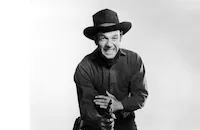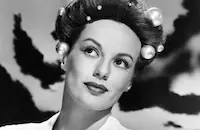The Very Thought of You

Brief Synopsis
Cast & Crew
Delmer Daves
Dennis Morgan
Eleanor Parker
Dane Clark
Faye Emerson
Beulah Bondi
Film Details
Technical Specs

Synopsis
After eighteen months in the Aleutian Islands, a group of soldiers, including Dave Stewart and his friend, "Fixit" Gilman, are sent home for a brief rest. On a three-day pass, Dave and Fixit visit Dave's alma mater, the California Institute of Technology in Pasadena. Fixit is only interested in meeting women and, on the bus there, picks up Cora Colton, a worker in a parachute factory. Dave meets Janet Wheeler, another factory worker, who recognizes him from the days when she worked in the Cal Tech campus canteen. Because Dave knows no one in town, Janet invites him to dinner. During the evening, Janet's brother Cal becomes defensive about his 4-F classification, while her sister Molly, who is married to a sailor, admits that she has been dating other men while he is overseas. Janet's mother disapproves of her dating soldiers and is very rude to Dave. Only Janet's younger sister Ellie and her father are pleasant to Dave, so he leaves early. The next day, Ellie spots Dave eating breakfast in the drugstore and rushes home to fetch Janet. Dave has rented a car and asks Janet to accompany him to Mt. Wilson. They return late, having missed Thanksgiving dinner, and spend the rest of the evening in Cora's apartment. Fixit takes Cora dancing, leaving Dave and Janet alone together, and the exhausted Dave falls asleep. It is three o'clock in the morning by the time Janet returns home. Without waiting for an explanation, Janet's mother slaps her and storms off to bed. Alone with her sympathetic father, Janet reveals that Dave wants to marry her. Mr. Wheeler encourages Janet to accept his proposal if she loves him, even though they will be separated by the war. The next day, Janet telephones Dave from work and is informed that he has checked out of his hotel. After work, however, Dave and Fixit are waiting outside the factory for Janet with an engagement ring. Dave and Janet are quickly married and have a brief honeymoon before Dave must report to San Diego the following morning. Although Janet's family accepts the marriage, Molly advises her that she will forget Dave after he is gone. She then intercepts Dave's letters and telegrams. Later, Dave receives a twenty-four leave and telephones Janet at the factory to join him in San Diego. Having guessed what happened to Dave's letters, Janet tells her family that she will not come back home to live. After Dave leaves again for the war, a pregnant Janet moves in with Cora. Later, Molly's husband Fred returns. Molly confesses her involvement with another man and begs Fred to take her back. When Janet has her baby, a boy, a reunited Molly and Fred visit. Then Cora learns that Dave and Fixit have been wounded. After the men recover, they are sent home. In the meantime, Ellie has become engaged to a soldier; Cal has been reclassified 1-A; and Mrs. Wheeler has grown proud of her son-in-law. Dave sees his son for the first time, and Fixit is happily reunited with Cora.

Director

Delmer Daves
Cast

Dennis Morgan

Eleanor Parker

Dane Clark

Faye Emerson

Beulah Bondi

Henry Travers

William Prince

Andrea King

John Alvin
Marianne O'brien
Georgia Lee Settle
Dick Erdman
Francis Pierlot
John Roy
Bob Gary
Jim O'gatty
Doria Caron
Edward Fielding
Al Woods

Jack Mower
Sybil Lewis
Royne O'neil
Colleen Townsend
Wally Walker
Victoria Vinton
Jay Ward
Philip Van Zandt
Henry Sharp
Buddy Gorman
Joe Bernard
Walden Boyle

Eddie Kane
Charles Marsh
Loie Bridge
Casey Macgregor
Dick Bartell
Sheldon Jett

Angela Greene
Esther Michelson
John Whitney
Sam Mcdaniel
Fred Chapman
George Nokes
Sandy Tucker
Dickie Dillon
Blayney Lewis
Carol Joyce Coombs
Myron Tobias
Harold Shields
Justus Motter
Eddie Motter
Earl Jacobs
John Burton
Patsy Mccaskell
Paul Spinner
Warren Cross
Charles Hogan
Crew
Milo Anderson
Leo Arnaud
Alvah Bessie
Everett A. Brown
Alan Crosland Jr.
Delmer Daves
Gordon M. Davis
Paul Detlefsen
Leo F. Forbstein
Charles David Forrest
Bert Glennon
William Guthrie
Leo Kuter
Art Lueker
Warren Lynch
Fred Maclean
E. Kenneth Martin
Ray Noble
George Nogle
Jerry Wald
Jack L. Warner
Franz Waxman
Perc Westmore
Lionel Wiggam

Videos
Movie Clip



Trailer
Film Details
Technical Specs

Articles
The Very Thought of You
Eleanor Parker plays the "good" girl, Janet Wheeler, who works in a munitions factory to help support the war effort and her disagreeable family, played by Henry Travers and Beulah Bondi, John Alvin, Andrea King and Georgia Lee Settle. On her way home from work in Pasadena, California, Parker and her friend, played by Faye Emerson, meet two GIs on leave from their post on the Aleutians, played by Warner's musical star Dennis Morgan and up-and-coming actor Dane Clark. Romance blossoms quickly over Thanksgiving and Morgan and Parker decide to get married immediately.
Instead of being surrounded by support, Parker's family (with the exception of Travers and Settle) are violently opposed to both Morgan and the marriage. Screenwriter Alvah Bessie and director Delmer Daves' adaptation of Lionel Wiggam's original story portrays the Wheeler family so harshly that the critics made note in their reviews, with one calling them a "selfish, bitter, evil-minded lot." Just as jarring was the expressed hope by a civilian that the war would last longer because of the resulting economic prosperity after so many years of struggling through the Depression, seeming not to care that their new-found prosperity came with the cost of human lives.
Eleanor Parker, who had just appeared with John Garfield and Paul Henreid in Between Two Worlds (1944), was given her first leading role for Warner Bros. by default, when the intended leading lady, Ida Lupino, had to bow out because of illness. For Parker, the role of a young war bride must have hit home, as she had also made a wartime marriage after a short romance. That marriage broke up after only a year, and the couple would divorce two months after The Very Thought of You was released in October 1944.
Andrea King signed a seven year contract with Warner Bros. in late January, 1944, just a few weeks before The Very Thought of You went into production on March 6th. With her new contract came a new name, as Jack Warner thought King's real name, Georgette McKee, sounded like a stripper. The Very Thought of You was a happy experience for King because she became good friends with Eleanor Parker. King's husband was off to war, and she had just purchased a home an hour and a half away from Warner Bros. Because of gas rationing and the long distance King would have to drive each day to and from the studio, Parker, who lived five minutes from Warner Bros., invited King to stay with her during the five weeks of filming. King later said, "Eleanor Parker was a dear to work with [...] She was just wonderful."
Playing King and Parker's brother was John Alvin, who remembered enjoying shooting the film because "I got to have a lot of corny but funny lines, and the director Delmer Daves allowed us to interject lines on our own. It was kind of fun because we could ad lib if we wanted to and it fit his idea."
The Very Thought of You was premiered in Milwaukee, Wisconsin (Dennis Morgan's home state) on Halloween, 1944. The critics were mixed, but Parker, King and Clark were singled out as having given excellent performances. Seventy years later, The Very Thought of You, like The Best Years of Our Lives (1946) gives modern audiences a glimpse into life during World War II that still resonates.
By Lorraine LoBianco
SOURCES:
http://www.andreaking.com/Biography-Frames.htm
Bubbeo, Daniel The Women of Warner Brothers: The Lives and Careers of 15 Leading Ladies
"Eleanor Parker Gets Starring Role" The Deseret News 17 Apr 44
"The Very Thought of You" Pittsburgh Post-Gazette 8 Dec 44
Weaver, Tom Science Fiction Confidential: Interviews with 23 Monster Stars and Filmmakers
"The Very Thought of You" Windsor Daily Star 20 Feb 45

The Very Thought of You
Quotes
Trivia
Notes
New items in Hollywood Reporter add the following information about the production: Eleanor Parker replaced Ida Lupino after the latter became ill. Some scenes were shot on location at Mt. Wilson outside Los Angeles. In a September 6, 1944 memo to location manager William Guthrie, Colonel Curtis Mitchell, A.U.S. Chief, Pictorial Branch of the War Department, objected to a scene in the picture in which a wife learns that her husband is wounded by reading a casualty list in the newpaper. The studio recalled all negatives of the film and changed the scene so that the wife receives a telegram from the War Department advising her that her husband had been wounded, as was army policy.















